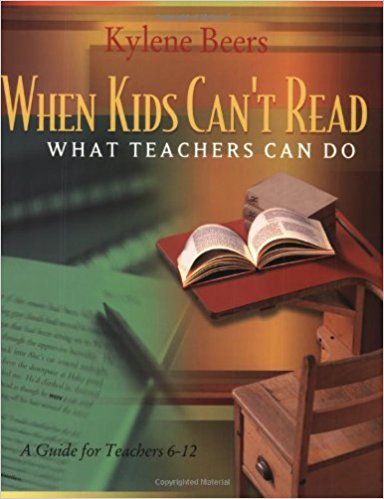 Do Kids Hate to Read?
Do Kids Hate to Read?
Search “kids hate to read” on Google and you’ll find an alarming batch of research to confirm that this is the norm in America.
Some studies even suggest that the standard way of teaching -- to assign core reading from only textbooks or have students read books from only their decoding level -- could dampen enthusiasm to read at all. Face it, if a book doesn’t interest you, you aren’t going to read it.
The Nation’s Report Card says only 36 percent of eighth graders read at proficiency level. This statistic increases slightly to 37 percent by high school. Additionally 1 in 5 students are dyslexic. These statistics suggest that a U.S. classroom could be filled with many low-level and non-readers who aren’t going to make the grade. This is a daily challenge for teachers, like BeLinda Martin at Buffalo Gap Elementary School in Texas.
Mrs. Martin’s 5th Grade Class
Mrs. Martin is a Reading and History teacher. About 20 percent of her class doesn’t like to read and some students have never passed a reading test. Determined to flip this paradigm, Mrs. Martin gave up some traditional teaching practices and beliefs.
She no longer teaches only to the test. She does not accept the idea that students will remain stuck in lower reading proficiency levels, and she does not rely on direct instruction alone to engage her students.
What Mrs. Martin does do is make reading fun and playful for struggling readers. She uses e-books with human-read audio intertwined with reward-based activities to motivate students to read, and read frequently. Martin believes that students must enjoy the act of reading before they will be successful learners.
Do Kids Read for Fun Anymore?
The National Center for Education Statistics conducts surveys of 9-,13,- and 17-year olds as part of the National Assessment of Education Progress (NAEP) long-term trend assessment. In addition to measuring children’s reading achievement, this survey of about 26,000 students included how often these young people read for fun. The data indicated a sharp drop once students hit middle and high school. According to the study, half (53%) of all 9-year olds, a quarter (27%) of all 13 year olds and one in five or (19%) of 17-year olds read for fun each day.
Research Says Motivation is Critical for Learning Success
Overwhelming evidence now supports "motivation to read" does have direct implications when it comes to achievement. (Gambrell, 2015; Jang et al., 2015; Fisher et al., 2018; Gambrell, 2011; Applegate et al., 2010; Mucherah et al., 2008)
Additionally, teachers identified “creating interest in reading” to be what they most cared about (Applegate et al., 2010).
 In her book, “When Kids Can’t Read,” Kylene Beers (1998) discusses how struggling readers tend to think that good readers are good, just because they are. These students do not realize that good readers employ strategies and techniques that help them read.
In her book, “When Kids Can’t Read,” Kylene Beers (1998) discusses how struggling readers tend to think that good readers are good, just because they are. These students do not realize that good readers employ strategies and techniques that help them read.
The reverse can also be true. Sometimes good readers’ strategies are so automatic they don’t realize what they are doing helps them get through a passage.
Confident readers monitor their understanding and determine meanings of words by using context clues and base word strategiesThey read with fluency, are willing and active participants in discussion and read with stamina.
You can Read Kylene’s article in School Library Journal, “LISTEN”.
Research by Beers, Melekogu and Wayne conclude:
-- “Struggling readers stop reading when the passage gets too tough, they turn to others for help, they read to get by, but tend to be inactive in discussions.” (Beers, 1998 & Melekogu, 2011
-- “Reading skill deficits can lead to negative attitudes about reading and lower motivation (Melekoglu, 2011). When struggling readers aren’t motivated to read, they don’t read and the result can be detrimental to their academic, social and emotional success. As one of the indirect but noteworthy reasons for low achievement in reading, motivation to read is an important key for all students with and without LD to be successful in school.”
-- “Struggling readers seldom get to experience how great it feels to finish a book and how much fun it can be to escape day to day life by jumping into a good book” (Wayne, 2011, pg. 8). (Melekoglu, 2011, pg. 249).
-- “Promoting motivation in struggling readers can have a positive effect and therefore should be an essential focus for educators.” Melekoglu (2011)
So how do we increase reading stamina and reading engagement? How do we help students understand the value associated with reading? How do we change the discourse for struggling readers and redefine a culture of readers? How do we ensure that students of all reading abilities are successful and improve academic achievement?
Let’s Continue the Conversation
 Watch a recording of the edWebinar held August 29, 2018 by Terrie Noland who gives a comprehensive review of research that MOTIVATION does MATTER when it comes to struggling readers and academic achievement. Her 10 research-based points have implications for administrators, educators and students.
Watch a recording of the edWebinar held August 29, 2018 by Terrie Noland who gives a comprehensive review of research that MOTIVATION does MATTER when it comes to struggling readers and academic achievement. Her 10 research-based points have implications for administrators, educators and students.
Gap in the Research
As importantly, there is also a gap in the current research. Terrie will shed new light on resources and strategies that “if addressed and implemented in schools,” could have a powerful and lasting positive impact on the motivation of struggling readers and their self-belief as successful learners and achievers. Join us for this EdWebinar. Educators receive CE credits.
Terrie Noland is the VP of Education Initiatives for Learning Ally. She develops engagement programs, professional learning services and communities for educators. Terrie has 25 years of experience as a motivational leader and developer of content.